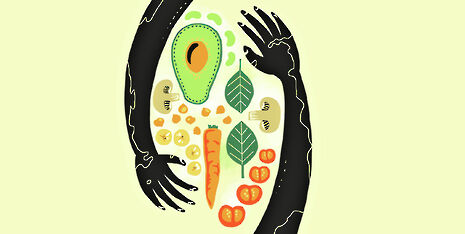Veganism can be wonderful, but don’t ignore the potential dangers of restrictive eating
In a culture increasingly oriented towards healthy habits, we must consider the potential dangers of extreme changes to diet.

Content note: this article contains detailed discussion of eating disorders and restrictive eating
Arguably, there has never been a better time to be vegan. Already in 2019, the so-called ‘Veganuary effect’ has had enormous ripples, from a hearty Gregg’s offering to the introduction of a vegan option at some of Cambridge’s most elaborate formal dinners. This trend is indicative of a culture increasingly adopting healthier eating habits. Veganism is more actively encouraged and more accessible than even just two years ago.
And yet this attitude often overlooks the danger that restrictive eating poses for some people. Veganism is a healthy lifestyle choice – if done in the right way and for positive reasons – so, naturally, this article will not represent the experience of many people’s dietary choices. However, in the context of eating disorder recovery, adopting a vegan diet can fall neatly into the grey area between healthy and unhealthy relationships with food. This is, of course, not true for everyone, but we must recognise that veganism can, for some, represent a dangerous form of restrictive eating.
Veganism can provide a convenient and socially acceptable way of furthering food-obsessive behaviours. In a culture increasingly concerned with health, one only has to half-heartedly scroll through Instagram to see a multitude of health and wellness bloggers proclaiming the virtues of veganism. With the seemingly exponential growth of veganism in the last year, and the prolific Veganuary campaign, adopting a new dietary pattern can be fairly unassuming. Rather than a complex, convoluted run of excuses, food can be refused with the simple ‘v’ word, disguising an intense fear of eating the ‘wrong’ foods with environmental and ethical concerns, as well as general health concerns. Indeed, there are valid reasons for adopting this diet, but, in certain cases, veganism is allowed to become a defence mechanism. Any indication of restrictive behaviour can appear to simply be part of a broader culture of healthy eating: this may be normalising unhealthy relationships with food.
“Food can be refused with the simple ‘v’ word, disguising an intense fear of eating the ‘wrong’ foods”
In our increasingly health-orientated culture, veganism is often regarded as an efficient means to lose weight; something which is featured heavily in the media. Dairy and eggs are condemned not only for their unethical means of production, but also for their fat and cholesterol content, for their cocktail of hormones and associated chemicals added during processing. All the same, many nutritionists have ultimately come to the consensus that dairy and eggs are good for our health, if eaten in moderation, because of the proteins, vitamins, and nutrients they contain. The discussion and provision of alternatives, supplying the nutrients missing from a vegan diet, provide another easy way for those suffering from restrictive eating disorders to avoid certain food groups that they may have demonised. The relationship between health culture and eating disorders continues: veganism can require checking the labels of anything found in the supermarket aisles, an action similar to the calorie-checking behaviour often observed as a symptom of eating disorders.
Some people have spoken about how veganism helped their changing relationship with food when taken on as part of recovery from an eating disorder: justifying food choices as beneficial to both the planet and the self can offer enough encouragement to keep working through recovery. We should celebrate this but remember that this is by no means the case for everyone.
We must remain aware that diets which involve majorly restricting what you can eat pose a danger for certain people, and it is becoming harder to discern when this is the case in a culture increasingly oriented towards healthy habits and diet trends.
We must not forget that someone still suffering or recovering from an eating disorder can be physically healthier in terms of their weight and meeting their nutritional needs but can still be ruminating on food in an unhealthy way. Ultimately, there are many good reasons to be vegan, but we must be conscious of the cultural dynamics operating within this dietary shift and we should not advocate such a radical change to eating habits without considering the potential dangers this may pose.
If you have been affected by any of the content of this article, B-eat Eating disorders provides useful information and resources, as well as a helpline at 0808 801 0677. The Students’ Union Advice Service provides a more comprehensive list of support resources.
 News / Eight Cambridge researchers awarded €17m in ERC research grants27 December 2025
News / Eight Cambridge researchers awarded €17m in ERC research grants27 December 2025 News / Downing investigates ‘mysterious’ underground burial vault 29 December 2025
News / Downing investigates ‘mysterious’ underground burial vault 29 December 2025 Lifestyle / Ask Auntie Alice29 December 2025
Lifestyle / Ask Auntie Alice29 December 2025 Sport / Hard work, heartbreak and hope: international gymnast Maddie Marshall’s journey 29 December 2025
Sport / Hard work, heartbreak and hope: international gymnast Maddie Marshall’s journey 29 December 2025 Interviews / Meet Juan Michel, Cambridge’s multilingual musician29 December 2025
Interviews / Meet Juan Michel, Cambridge’s multilingual musician29 December 2025









